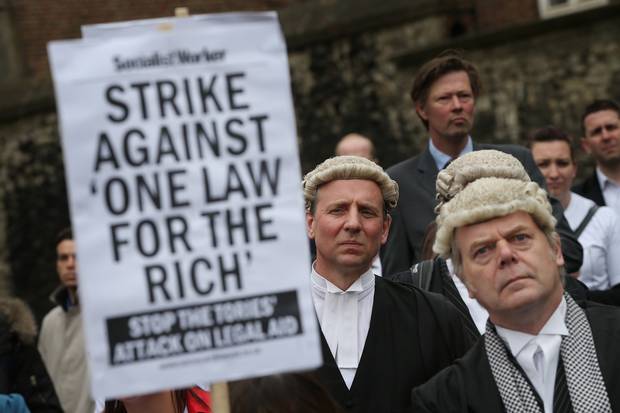 (Image Attribution:By Lonpicman (Own work) [CC-BY-SA-3.0 (http://creativecommons.org/licenses/by-sa/3.0) or GFDL (http://www.gnu.org/copyleft/fdl.html)], via Wikimedia Commons))
(Image Attribution:By Lonpicman (Own work) [CC-BY-SA-3.0 (http://creativecommons.org/licenses/by-sa/3.0) or GFDL (http://www.gnu.org/copyleft/fdl.html)], via Wikimedia Commons))
– Hannah Harrison (LLB Law, Newcastle University) h.e.harrison@newcastle.ac.uk
Since his tenure as Director of Public Prosecutions ended on 1st November 2013, Keir Starmer has been leading an enquiry for the Labour Party about transforming victims’ rights in the criminal justice system. In a recent article for the Guardian, Starmer called for a Victims’ Law to protect vulnerable victims of sexual abuse and to support them through the invasive, distressing trial process. Although witness services exist to comfort victims throughout their time in court, Starmer suggests that change is needed to ensure victims feel safer and have more confidence in the criminal justice system.
Starmer evidences the need for change by highlighting the inability victims often feel to even report a crime in the first place. All of the ‘214 victims of recordable offences’ in Operation Yewtree, known as the Jimmy Saville case, reported the incidents following his death and when asked why there was a delay in making a statement ‘many cited a fear of not being believed or a feeling that the criminal justice system would be ineffective in prosecuting the offender’. Starmer states that the ‘crude’ police tests into checking witness credibility often discourage victims from making a statement. Even if a victim does have the courage to step forward, the focus by police and prosecutors, on whether the ‘victim was able to give a coherent and full account first time, whether the victim had returned to the perpetrator, and whether the victim had been affected by drink or drugs’ disheartens many who feel they are not being taken seriously. As Starmer indicates, ‘if the criteria for testing their credibility match the characteristics that make them vulnerable in the first place’ surely this is a fundamental flaw in the approach of criminal justice? We should be identifying victims’ vulnerabilities and supporting them and not discriminating them because of these things.
Furthermore, the adversarial system in court lacks support for victims, especially those of sexual abuse. The battle between prosecution and defence to extract all of the intimate and humiliating details from a witness is traumatising to them. Having to retell the worst event of their lives in excruciating detail to a room full of strangers, whilst facing the perpetrator, is highly distressing. Very recently, Tracy Shelvey fell to her death after being told that the man she accused of rape was acquitted. Officers reported that she was ‘angry and upset’ and was even visited at home, before her death, by ambulance and police staff after she called them in a highly distressed state. The Greater Manchester Police and Crime Commissioner, Tony Lloyd expressed a need ‘to learn from this tragedy and others that have come before’ as it ‘is abundantly clear is that victims and witnesses are not where they should be – at the heart of the criminal justice system’. He further highlighted that the issue of victim support was of grave concern and that it is crucial to constantly support victims from the initial reporting of the crime until after the trial has concluded. Starmer and Lloyd both agreed that a more radical review and an upheaval of the current system are needed.
Sadly, this is not the first case where a victim has been so deeply affected by a trial. The family of Francis Andrade are adamant that she was driven to suicide after she accused her former teacher of rape. Mrs Andrade took her own life whilst the trial was ongoing, mere days after she was cross-examined on events that had occurred when she was a teenager. Her son Oliver stated that being branded a liar and a fantasist during the trial seriously compromised her personal integrity, ‘more than she could bear’. It was reported that the judge had to ask Mr Brewer to avert his gaze from her after she felt too under pressure from his stares whilst in the witness box. Mrs Andrade’s husband told the court that she had become deeply depressed following her initial police interview and the fact that she died before a verdict was reached illustrates the intense pressure victims are under in the witness box. Tragically, another woman took her own life two years after alleging she had been raped by two soldiers. The inquest was told that Corporal Anne-Marie Ellement, a royal military police officer who was found hanging in her barracks, was left absolutely devastated by the decision not to prosecute the two soldiers she claimed had raped her while she was stationed in Germany.
A code of practice for victims was released in October 2013 but the death of Miss Shelvey since then, confirms that more must be done to help those in need. Although the code of practice is detailed and comprehensive in how victims can obtain support, it does little to address the need for mental health support, which often troubles victims of sexual abuse.
Starmer’s investigation is still ongoing and he is yet to release any details on his proposals for reform. Following the death of Miss Shelvey, the Ministry of Justice admitted that ‘more could be done’ to help vulnerable witnesses. It added that they are currently trialing a new way of ‘sparing vulnerable witnesses the trauma of appearing in court’ through pre-trial cross examination. Despite this, Tony Lloyd announced that he would be writing to the Home Secretary and the Justice Secretary to demand a review of the current support system for witnesses and alleged victims.
Giving evidence is a harrowing often brutal ordeal, especially for victims of violence or sexual abuse so what is needed is a focus on those deeply affected by crime. As Starmer identified, ‘this is a golden opportunity to recast the criminal justice system as a criminal justice service fit for victims’.
